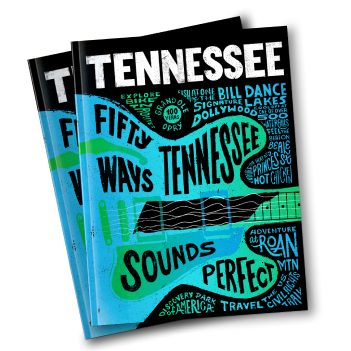January 31, 2022
Thanks to the U.S. Civil Rights Trail, travelers have connected access to more than 100 locations in 14 states that played a significant role in the Civil Rights Movement during the 1950s and 1960s. Tennessee has 15 stops along the trail that tell the stories of the brave men and women who brought words to action through peaceful protests and legal actions to secure their American civil rights. You can follow their footsteps through Memphis, to Nashville and end in the quiet but historically significant town of Clinton in East Tennessee to hear the stories of foot soldiers and learn the history of Tennessee’s role in the Civil Rights Movement. Download the brochure or get the digital passport below:
Get the Digital Passport
Memphis
Clayborn Temple/ I AM A MAN Plaza
Start your journey at the Clayborn Temple in Memphis. Clayborn Temple’s ties to the Civil Rights movement reached a pinnacle in 1968 when it became headquarters for the Memphis Sanitation Workers’ Strike. Starting in February 1968, nearly 1,000 sanitation workers marched twice daily from the church to City Hall carrying signs declaring “I AM A MAN.” In the evenings, strikers, their families, and supporters filled the sanctuary for inspirational speeches Located next to Clayborn Temple, the I AM A MAN Plaza features a sculpture alongside a wall filled with the names of those who participated and rallied in the historic 1968 Memphis sanitation strikes. Due to a devastating fire, the Temple is not available for tours.
Dr. Martin Luther King Jr. delivered his prophetic “Mountaintop” speech on the eve of his assassination – April 3, 1968 at the Mason Temple Church of God in Christ. On that night, 3,000 people demanded to hear Dr. King as he came to Memphis to support the 1,300 striking sanitation workers who met regularly at this church. Unfair working conditions and poor pay led to the strike and the response of a court injunction that banned further protests. King hoped their march would overturn that court order. To inspire the people, Dr. King famously said, “...And I’ve seen the promised land. I may not get there with you. But I want you to know tonight, that we, as a people will get to the promised land.”
Charles Vergos' Rendezvous
Discover the history of the Civil Rights Movement and global human rights struggles at the National Civil Rights Museum. Located at the historic Lorraine Motel, where Dr. Martin Luther King Jr. was assassinated, the museum preserves key landmarks—including the balcony where Dr. King was killed and Room 306, where he spent his final night. Through immersive exhibits featuring videos, text, photographs, and interactive media, the museum traces the journey for equality from 1619 to 2000. It's a powerful tribute to those who fought for justice and a reminder of the work still to be done. Hours: Open daily except Tuesdays.
Sunrise Memphis
WDIA Radio is the first radio station in the country programmed entirely for the African American community. The station aired on June 7, 1947, featuring African American radio personalities and brought awareness to a relatively new market of listeners. The station’s influence and popularity reached 10% of the Black population in the U.S. Music legends such as B.B. King and Rufus Thomas got their start by working at WDIA. Though currently not in use, visit the historic WDIA building in downtown Memphis, see the WDIA neon marquee, and stand outside the original entrance where this famed station first began broadcasting.
Created in 1841, Beale Street is one of the most iconic streets in America. It began as a thriving area for commerce, musicians, Black-owned businesses and was home to Ida B. Wells’ anti-segregationist newspaper. Four District locations are particularly significant to the Civil Rights Movement: Historical Daisy Theatre/Randle Catron Interpretive Center, Withers Collection Museum & Gallery, First Baptist Beale Street Church; and Robert R. Church Park.
Stax Museum of American Soul Music, located on the original site of Stax Records studio since 2003 and now a Tennessee stop on the U.S. Civil Rights Trail, pays special tribute to the artists who recorded there, as well as other American soul legends. Many of the artists and musicians who recorded at Stax were from the surrounding neighborhood, local churches and schools. In a time when racial tension was high, the studio was integrated from day one, focusing on producing its own sound, a Memphis sound. Stax launched its Virtual Black History Month Tour, which is available at no cost to educators and students throughout the world.
Withers Collection Museum & Gallery
Photo Credit:
Justin Fox Burks/Memphis Travel
Born in 1922, Ernest C. Withers, a native Memphian, was an internationally acclaimed photographer recognized for his iconic photographs in Memphis and the broader South during the Civil Rights Movement. He accumulated a collection of an estimated 1.8 million photographs, which the Withers Collection Museum & Gallery is working to digitize. Some of his most famous shots are those taken during his coverage of the Memphis Sanitation Workers Strike in 1968, which culminated in the assassination of Dr. Martin Luther King, Jr. Through the power of photographs and stores, the Withers Gallery honors Ernest Withers and tells the moving story of Memphis and American history in the Civil Rights Movement.
Places to Stay - Memphis
The Peabody Hotel
Have a historic stay at The Peabody Hotel Memphis featuring beautiful accommodations, a hotel lobby that seems to be from a dream and a nod to the duck history of the hotel in the duck-shaped soaps, stitched ducks on towels and stationary and more found in the rooms. Enjoy relaxing spa treatments at Feathers Spa and treat yourself to a culinary masterpiece when you dine at Chez Philippe inside the hotel.
Places to Eat - Memphis
The Arcade Restaurant
There’s a reason The Arcade Restaurant is Memphis’ oldest café. Visitors and locals come here for the wide selection of breakfast items. French toast smothered in syrup, fluffy sweet potato pancakes that are a favorite of the Food Network, omelets by your own design, and the Eggs Redneck which the Travel Channel is a fan of featuring sausage, chicken or bacon with biscuits in gravy, eggs and hash browns.
Charlie Vergos' Rendezvous
You can’t make a trip to Memphis and not sample the fine barbecue joints around town. One of the iconic places to dine is Charlie Vergos’ Rendezvous where heavenly ribs are just an order away. The meat falls off the bone and is doctored in an array of spice that will make you want even more. They also have barbecue sandwiches served with slaw and beans, brisket, chicken and even lamb riblets.
Sunrise Memphis
You’ll want everything on the menu at Sunrise Memphis. Give your day a boost with the Dirty South biscuit sandwich topped with pimento cheese, fried green tomato and the in-house Sunrise sauce. Plates include the decadent banana bread French toast, breakfast tacos stuffed with chorizo, pico de gallo, salsa verde and cotija, and the barbecue chicken omelet with shredded chicken, cheddar cheese, barbecue, onions, onion straws and more. The gravy bowl is a favorite with a biscuit, sausage, scrambled eggs and cheese all covered in sausage gravy. There’s also a vegan bowl full of tofu, spinach, peppers, onions, drizzled with sriracha and scallions.
Nashville
Civil Rights Room at the Nashville Public Library
Step inside the pristine Nashville Public Library and climb the marble stairs to the second floor where you’ll find the Civil Rights Room. This is a space for education and exploration of the Civil Rights collection, which includes black-and-white photographs of the events surrounding Nashville during the 50s and 60s. Sit at the symbolic lunch counter to see the Ten Rules of Conduct protestors adhered to during their peaceful sit-ins, as well as a timeline of local and national events. You can even see the intersection of Church Street and Seventh Avenue North through the library’s large windows where nonviolent protests against segregated lunch counters occurred. The Room is open to the public during regular library hours.
Make your way to 14th Avenue North in downtown Nashville to see the Clark Memorial United Methodist Church that served as a meeting site for many civil rights efforts. James Lawson hosted nonviolent protest workshops in 1958 at the church; and Dr. Martin Luther King Jr. had the Southern Christian Leadership Conference annual meeting there in 1961.
You can head to the Davidson County Courthouse next. In April of 1960, after the bombing of the home of Z. Alexander Looby , a lawyer for civil rights cases, 2,500 students and others met and marched to the Davidson County Courthouse. There they met with Mayor Ben West who conceded that segregation was immoral and that the city's lunch counters should be de-segregated.
Located next to the Courthouse, Witness Walls, created by artist Walter Hood , tells the stories of the events and the people who made civil rights history in Nashville. Walk among Witness Walls to see school desegregation, marches, meetings, Freedom Rides, lunch counter sit-ins and economic boycotts represented on the concrete walls. Witness Walls was dedicated in 2017 and is a project of the Metro Nashville Arts Commission’s Percent for Public Art Program.
In the heart of downtown Nashville, Woolworth Theatre is now a restored restaurant and live music venue that pays homage to the early days of the civil rights movement. In 1960, it was the site of peaceful sit-ins by African-American students who challenged Woolworth and other stores that did not allow Black and white customers to eat at the same counter. While the sit-ins were peaceful, the reactions of some whites were not. This was the site of civil rights hero John Lewis’ first arrest in his lifelong fight for equality.
Fisk University, founded in 1866, is the oldest university in Nashville. The first African American university to receive accreditation from the Southern Association of Colleges and Schools, Fisk University students were instrumental in many of the sit-in demonstrations throughout Nashville. You can learn about the university’s history and some of its famous alumni including Ida B. Wells-Barnett and U.S. Representative John Lewis. Thurgood Marshall (the first African-American Justice of the U.S. Supreme Court) was among the early participants in Charles S. Johnson’s famous Race Relations Institute at Fisk. You can also visit the extensive art collection in the Carl Van Vechten Gallery.
Next, you can visit Griggs Hall, the first building constructed on the campus of American Baptist College, a seminary for Black students. It became the center for non-violent training and activity in the Nashville area, especially the Nashville sit-in program. Griggs Hall was restored in 2015 and is listed in the National Register of Historic Places. Tours are available by appointment only. Please contact officeofthepresident@abcnash.edu.
The National Museum of African American Music is now a stop on the Tennessee portion of the U.S. Civil Rights Trail. The museum is dedicated to preserving and celebrating the many music genres created, influenced and inspired by African Americans. The “One Nation Under a Groove” gallery is focused on how music inspired the Civil Rights Movement and evolved with the issues of the day. Educational programs, programming and events spotlight the achievements and influences of African American music.
Noelle, in Nashville’s downtown area, is a convenient location to stay after exploring Nashville’s stops along the U.S. Civil Rights Trail. Located on 4th Avenue, the building was built in 1930 and has always been at the center of Nashville’s vibrancy. Today, the hotel provides modern decor throughout the property, a beautiful restaurant and airy and open rooms to its guests. Take a short walk to the downtown Civil Rights Trails locations and take in Nashville’s iconic city vibe.
Stay at the same hotel as Oprah Winfrey, The Who, Adam Levine, Franklin D. Roosevelt others have when they were in Nashville. Constructed in 1910, The Hermitage Hotel is Nashville’s Original Hotel and is quite impressive with its grand staircase, ballroom, and veranda blended with Italian and French Renaissance touches. Be swept away in the opulence of your room as each features 500 square feet of space, soft bedding, Wifi, plush robes, an in-room pillow menu in case you’d like buckwheat, down or memory foam pillows, large marble bathrooms and more.
Places to Eat - Nashville
Deacon's New South
Housed in Nashville’s first-ever skyscraper - the L&C Tower, Deacon’s New South is a steakhouse that features Southern favorites with locally-sourced produce and protein when possible. Make your dinner memorable by ordering the diver scallops that come with cauliflower and olives in a beurre blanc sauce, a crafted cocktail from the extensive menu, and the apple jack stack – boozy apple pear butter, candied walnuts and apple cider vinegar gastrique – for dessert.
Start your night off with one of the signature cocktails crafted at Germantown Pub. The Cumberland Cooler is a refreshing choice with Hendricks Gin, St. Germaine Elderflower Liqueur, cucumber, a splash of lime juice and simple syrup. The Honeysuckle Lemonade is a boozy Arnold Palmer with Cathead Honeysuckle Vodka, St. Germaine Elderflower Liqueur, honey water and lemon juice. Blackberry sangria, a selection of beers on draft and wine are also available. Pair your drink of choice with one of Germantown Pub’s delicious burgers like the GTP Burger featuring a fried egg, Swiss cheese lettuce, tomato and onion or the Gerst Burger with Yazoo Gerst beer-braised onions served on a pretzel bun. Wings smothered in sauces like Nashville hot to garlic parmesan, buffalo and the special Germantown are also on the menu as well as salads, chicken and waffles, fish and chips and more.
Shugga Hi Café makes every morning great with breakfast served a variety of ways. The Chicken & Waffles will have you singing with the Shugga Hi Café waffle flavor of the day topped with fried chicken and drizzles with syrup. Savor Da Bomb plate that features two biscuits, eggs, bacon, sausage, cheese and honey butter. The Big Man steak and eggs will satisfy anyone with a meaty rib-eye steak, two eggs and toast.
The inspiration for The Twelve | Thirty Club comes from the 19th-century supper clubs when the closing time for restaurants and pubs was 12:30 a.m. The supper clubs were able to stay open because they were deemed as private establishments. The glamour of the age is reflected in the decor, music and ambiance. There are three different menus - the honky tonk menu which has entrees like chicken fried chicken, New York strip steak, meatloaf and burgers; the supper club menu boasting seafood towers, steaks, lobster, king crab, wagyu Bolognese and more; and the rooftop menu which includes cocktails, beers, bottle service and frozen cocktails.
You can learn about the courageous stories of the Clinton 12, who bravely fought for equal access to public education. Step inside a 1950s classroom and see what life was like under "Jim Crow" laws. Follow the chronological story of the desegregation of the Clinton High School, the first integration of a public high school in the South, with life-size photographs and narratives.
Your historic stay can be found at the Cabins on Cedar Ridge. These cabins are 1860-er log cabins that have been renovated with today’s amenities. Enjoy the wood-burning fireplace; make delicious meals in the fully-equipped kitchen; enjoy free Wi-Fi, satellite TV, two bedrooms and one bathroom.
Where to Eat in Clinton
Have dinner in downtown Clinton at the Apple Blossom Café, a family-owned establishment. Try a variety of salads from the fried shrimp salad to the club salad with ham, turkey, bacon, cheese and potato sticks. Entrees include southern classics like country style steak, grilled catfish, country fried chicken that come with your choice of sides like turnip greens, Cole slaw, macaroni and cheese, fried okra and fried apples. Save room for the freshly baked cobbler or homemade chocolate cream pie.
Whether you prefer savory or sweet breakfasts, Master Donuts in downtown Clinton delivers. Sausage kolaches, a variety of glazed, cream stuffed and sprinkled donuts and breakfast biscuits are available. Take a few selections on the road with you as you explore Clinton. It’s likely you’ll be back for more.
Dine at an authentic soda fountain lunch counter at Hoskins Drug Store and order the day's lunch specials, full breakfast with biscuits and gravy, home cooked vegetables and grilled sandwiches. Finish your meal with a milkshake, malt or a banana split. Stop in the gift shop and wander the full-service pharmacy. It's a step back in time in Clinton, Tennessee.
You can easily spend a whole morning or afternoon visiting the Museum of Appalachia, a 65-acre pioneer mountain village dedicated to telling the stories of those who settled in the mountains and hollers of the region. More than 250,000 artifacts in three buildings are on display ranging from musical instruments to Native American pieces, folk art, quilts and an actual post office that served the village of Arthur, Tennessee as well as a replica of a country store. Thirty-five log structures like cabins, barns, churches and schools are erected around the property bringing history to life.
Stretch your legs after the drive on the many hiking trails found at Norris Dam State Park near Clinton. If you want an easy stroll, select the Lakeside Trail which is in close proximity to the historical Norris Dam, the Tennessee Valley Authority’s first dam built under President Roosevelt’s New Deal. For a moderate challenge, try the 1.95-mile Andrew’s Ridge Trail which has minor elevation changes and winds through remnants of the old home sites that were once on the ridge prior to Norris Dam. The state park has backcountry camping on top of Andrews Ridge with beautiful views as well as two campgrounds with a centrally-located bathhouse. A laundromat is located next to the park office. There are also 10 cabins with three bedrooms, one bathroom, living room and kitchen. Enjoy the sounds of nature on the porch, around the picnic table or fire pit.






















































